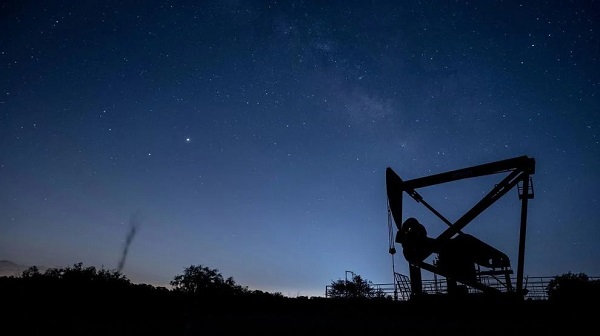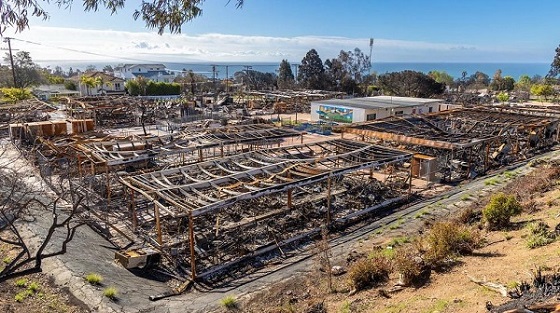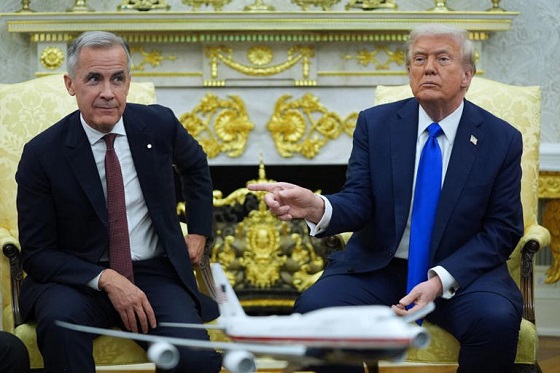Frontier Centre for Public Policy
Let’s Make Canada Great Again!
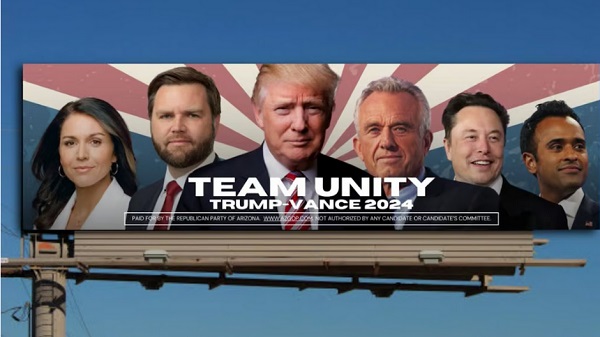
Trump’s Team Unity… Tulsi Gabbard, JD Vance, President-elect Donald Trump, Robert F. Kennedy Jun., Elon Musk, Vivek Ramaswamy… if they’re able to do all they’re promising, Canada will be more uncompetitive yet, writes Brian Giesbrecht and the best and brightest will leaveTrump campaign.
From the Frontier Centre for Public Policy
Trump will make America so tempting to the talented, that we’re going to get more uncompetitive still
“The number of people migrating to the US is not the main concern, more importantly it is who is leaving.”
The “brain drain” is a problem that has been a real concern for Canada at many times in our history. In the 1990s it was a topic fiercely debated by policy wonks, politicians and other concerned Canadians. Many of our best and brightest were benefitting from expensive college and university educations here, then promptly moving south for better opportunities.
Simply put, when Canada raises taxes, and stifles economic opportunity for young people here, while the Americans are lowering taxes and opening up their economy to the south of us, we can expect to see much of our best talent move south.
That’s what we have been seeing for some time now — doctors, engineers, trades and businesspeople of all types moving to escape the high taxes and the stagnant economy they see in what is today’s high-tax, big government, woke Canada.
Since 2015, housing costs have risen much faster than wages, making house ownership and rent costs absolutely punishing. Excessive immigration numbers have only added to the misery. Canada, for many years considered to be one of the best western countries in which to live is now one of the worst.
Canada’s current brain drain trickle can be expected to turn into a flood. Trump has promised to deregulate, lower taxes and “drain the swamp”. His appointment of Elon Musk and Vivek Ramaswamy to the mischievously named “DOGE” (Department of Government Efficiency) is evidence of his seriousness.
As evidence of how quickly things are turning, consider the huge stock market gains that happened as a direct consequence of Trump’s election. Clearly, the “smart money” is anticipating that Trump’s promises to “drill, baby, drill” and reinvigorate an over-regulated and over-taxed Biden economy are more than empty promises.
So, while right now Trump is busy trolling Democrats with his cabinet picks, by the time we get around to a spring election here it is probable that Trump will have the American economy galloping along. Meanwhile, at the same time that Trump is lowering taxes and deregulating, the Trudeau government is going in exactly the opposite direction.
Chrystia Freeland is determined to raise the capital gains tax. A capital gains tax hike will cause widespread damage. Meanwhile her proud socialist colleague, Steven Guilbeault — who has never seen an extra tax or regulation he doesn’t like — is dead-set on hiking Canada’s job-killing carbon tax yet again.
And let’s not forget the Trudeau affirmative action, DEI, merit-killing philosophy that has steadily eroded our competitiveness and standard of living. When contrasted with the Biden race-based version of the same, it was bad enough that Canada’s productivity continues to fall relative America’s. (Our sickly dollar is barely over 70 percent of theirs, while our government expenditures make up a staggering 44% of GDP.)
The contrast between the two economies can only be expected to become more pronounced as Trump’s America becomes increasingly merit-based. DOGE will take a meat cleaver to government spending, and the DEI, critical race theory Bidenite mush, will be trashed.
While Canada is still dealing with such woke idiocies as boys in girl sports, child mutilation in the name of gender ideology, and pretending to believe indigenous activist claims about secret burials of indigenous school children, Trump’s America will look very attractive to ambitious young Canadians who want to skip the wokeism, and raise their families in a country that rewards hard work. It will be hard to blame our best engineers, and tradespeople from heading down to exciting opportunities in Texas, Montana and elsewhere in the United States, when their talents are not appreciated here.
Many have already departed. Canadian accents are increasingly common in Texas. The contrast between a Trump America that rewards hard work, and a Trudeau Canada that only taxes it will be stark. Enterprising Canadians will face the choice of staying in a Canada that takes bigger and bigger bites out of paychecks, or moving to a country that doesn’t.
Let’s remember that many of our highly educated doctors and professionals are recent immigrants, with no special loyalty to Canada. Steven Harper also spoke of the “anywhere people” and the “somewhere people”. Those in the first category are the educated and privileged class whose have the money and talent that make it possible for them to move anywhere in the world on short notice. We need both the talented immigrants and “anywheres”, but they will be the first to leave.
Canada has gone through similar brain drain episodes before. During the 1990s there was a very real concern that we were losing far too many good people. A debt problem that began with the big-spending Pierre Trudeau government got steadily worse, our civil service was bloated, and taxes were far higher than they were for our American counterparts. To their credit, the Chrétien/Martin government introduced a budget in 1995 that helped with those problems.
The incoming Steven Harper government 2006-15 further stemmed the tide of departures by building a competitive economy that had our dollar at par with the American dollar. For a brief time the Canadian dollar was even higher! In these days of our pathetic 70 cent dollar it now seems hard to believe that even happened.
There seems to be little hope that the current Liberal government — still dug in in Ottawa — will take steps to make our economy competitive with Trump’s. As Kevin O’Leary explains, the damage that Trudeau has done to the Canadian economy is incalculable.
Canada has been on a slow downward slide since 2015. This has been Canada’s “lost decade”.
But there are reasons other than just the economic for wanting to leave. Under Justin Trudeau Canada has become not only a poorer place, but a directionless dystopia for many conservative-leaning Canadians. Extreme progressivism — “woke” — is the Trudeau Liberal religion.
As Eric Kaufman points out, extreme beliefs, such as “a man becomes a woman by saying so,” the belief in such economy-killing absurdities as “carbon-zero by 2040,” “borders don’t matter,” “merit-based hiring is systemic racism” etc are accepted by only a small minority of Canadians, and yet those are the policies the current government is forcing on everyone.
To add insult to injury we have Trudeau tweeting “a trans woman is a woman,” “we accept all comers,” “Canada is a genocidal nation,” and other such inanities. The great majority of Canadians do not want Trudeau’s “post-national state with no core identity” bilge. They want Canada back.
Trump has promised to rid his country of the extreme progressivism that Americans so convincingly rejected on Nov 5. Post-election surveys have revealed that the single most important issue that persuaded swing voters to vote for Trump was Kamala Harris’s support for taxpayer funding for transgender surgery for prison inmates.
This bit of woke craziness proved to be a bridge too far even for those who usually voted Democrat.
We can expect to see a virtual war on woke when Trump assumes power. In fact, it is already happening. Absurdities, like men forcing their way into women’s sporting events and women’s spaces will come to an end. Most Americans simply don’t want radical progressivism. As Professor Kaufman’s survey shows (above) — neither do Canadians.
The old saying is that living next to America is like sleeping with an elephant. Every time that the elephant moves, we had better do so too. With the election of Donald Trump, Canada must quickly adjust to the moves that elephant makes. Or suffer the consequences.
The chance to do so will likely be next spring, when Justin Trudeau will finally be forced to call an election. His election strategy will almost certainly be the same one he has used against previous Conservative challengers — he accuses them of being “like Trump.” But this time this strategy might not work.
If Trump’s America is humming along on all cylinders, while Trudeau’s weak, woke Canada looks pathetic in comparison, this time Canadians might say, “Yes, like Trump’s America. That’s exactly what we want!”
We need our best and brightest to stay here. We need to end the brain drain. We can do that by making Canada into a 2025 version of the Canada we used to know.
Brian Giesbrecht, retired judge, is a Senior Fellow at the Frontier Centre for Public Policy. He was recently named the ‘Western Standard Columnist of the Year.’
Business
Finance Committee Recommendation To Revoke Charitable Status For Religion Short Sighted And Destructive
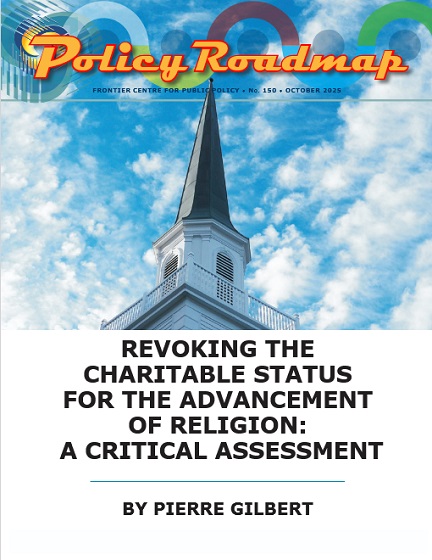
From the Frontier Centre for Public Policy
A new report from the Frontier Centre for Public Policy warns that proposed changes to Canada’s Income Tax Act could have devastating consequences for churches and faith-based organizations nationwide.
Revoking the Charitable Status for the Advancement of Religion: A Critical Assessment, by senior fellow Pierre Gilbert, responds to the 2025 Standing Committee on Finance’s recommendation to remove “advancement of religion” as a recognized charitable purpose.
If adopted, the measure could strip churches, mosques, synagogues, temples and religious charities of their charitable status. The impact would include the loss of income tax exemptions and the inability to issue charitable tax receipts. They could also face a one-time penalty tax that effectively wipes out most of what they own.
“The committee’s recommendation, driven by lobbying from the BC Humanist Association, represents a direct threat to religious freedom and the vital role faith communities play in Canadian society,” said Gilbert. “Religious organizations contribute an estimated $16.5 billion annually to Canada through social services, education, community programs and cultural preservation. Revoking their charitable status would be both fiscally shortsighted and socially destructive.”
The report traces the origins of charitable status in English common law, examines the rise of secularism and fiscal pressures driving the proposed change, and calls on churches to proactively respond through education, advocacy and reasserting their public mission.
Download full PDF here. (30 pages)
Energy
Indigenous Communities Support Pipelines, Why No One Talks About That

John Desjarlais of the Indigenous Resource Network and Norway PM Jonas Gahr at 2024 Arctic Frontiers Conference
From the Frontier Centre for Public Policy
Many Indigenous communities support pipelines and resource projects—but their voices are often drowned out by noisy activists and media narratives. Engineer and policy expert John Desjarlais, who works closely with First Nations, explains what Indigenous communities actually want and why their perspectives are ignored. Projects like Cedar LNG and Woodfibre LNG show Indigenous leadership and co-governance in action. Natural resources are foundational for Canada—and his vision might surprise you. (45 minutes)
-
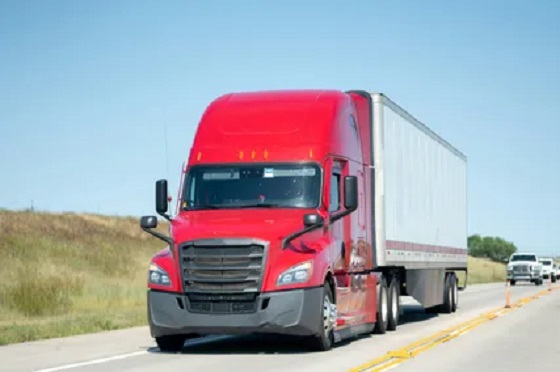
 Business2 days ago
Business2 days agoTruckers see pay surge as ICE sweeps illegal drivers off U.S. highways
-

 International2 days ago
International2 days agoHamas releases all living hostages under Trump peace plan
-

 COVID-192 days ago
COVID-192 days agoThe Trials of Liberty: What the Truckers Taught Canada About Power and Protest
-

 Energy11 hours ago
Energy11 hours agoIndigenous Communities Support Pipelines, Why No One Talks About That
-

 Business11 hours ago
Business11 hours agoFinance Committee Recommendation To Revoke Charitable Status For Religion Short Sighted And Destructive
-

 Alberta10 hours ago
Alberta10 hours agoOil Sands are the Costco of world energy – dependable and you know exactly where to find it
-
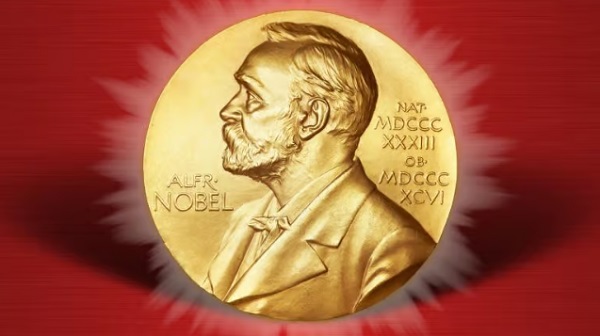
 Brownstone Institute2 days ago
Brownstone Institute2 days agoTrump Covets the Nobel Peace Prize
-

 Business2 days ago
Business2 days agoNetherlands Seizes Chinese-Owned Chipmaker in Unprecedented Security Move
